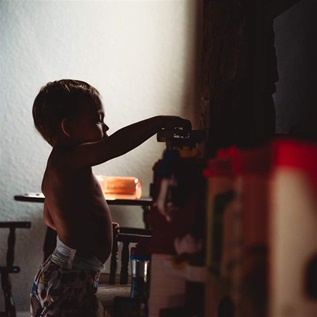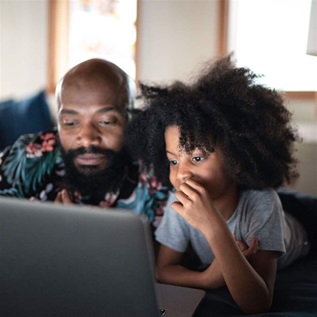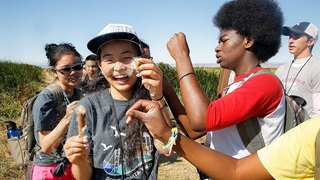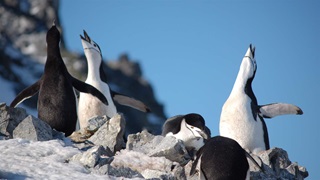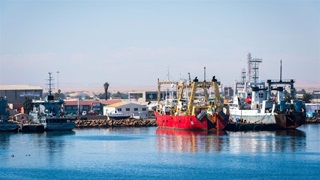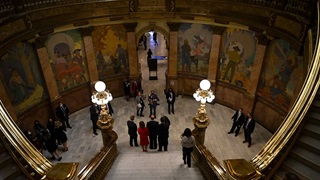Scientists Bring Innovative Research to Latin America
Pew biomedical fellows discuss the benefits of training in the U.S.
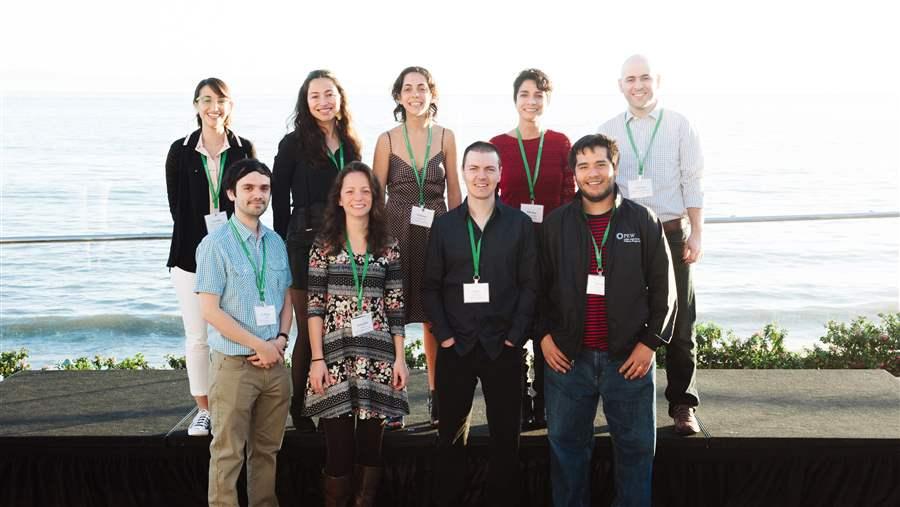
Members of the 2016 class of Pew Latin American fellows in the biomedical sciences continue to thrive in their research with the support of their peers. (Bottom row, left to right: Rodrigo Aguilar, Priscilla Olsen, José Cánovas, and Daniel Rodríguez-Leal; top row, left to right: Cecilia Silva-Valenzuela, Ileana Licona, Daiana Capdevila, Silvina del Carmen, and Vinicius de Andrade-Oliviera; not pictured: Guilherme de Oliveira.)
© Michelle Lauren/Pew Charitable Trusts
For more than 25 years, Pew has helped outstanding biomedical scientists from Latin America pursue postdoctoral training and research opportunities in the United States. Pew supports fellows selected for the program for two years under the mentorship of some of the most distinguished investigators in their fields, and awardees who subsequently return to Latin America receive additional funding to help purchase equipment and supplies to launch independent labs. About 70 percent of program participants have taken advantage of this incentive and are conducting basic biomedical research on emerging health challenges in eight Latin American countries.
Pew will announce the next class of Latin American fellows in June, and for a sense of what they might expect to experience, I asked four scientists from the 2016 class—Daiana A. Capdevila, Ph.D.; Daniel Rodríguez-Leal, Ph.D.; Rodrigo A. Aguilar, Ph.D.; and Priscilla C. Olsen, Ph.D.—about their first year in the program.
Q: What drew you to apply to the Pew Latin American Fellows Program in the Biomedical Sciences?
Dr. Capdevila: “This program gives me the independence to accomplish my own research goals and then the ability to receive funding upon return to my home country.”
Dr. Rodríguez-Leal: “As a scientist, we are always inclined to help others get excited about science and the discovery of new things. This fellowship provides support to build your own lab in your home country, start something that will have a real impact, and begin your own career there.”
Q: What is the most important piece of advice you’ve received from your mentor in the past year?
Dr. Aguilar: “There is not one way to pursue science. Be brave enough to take positions not just in a lab, but in other industries and areas where you can learn.”
Dr. Rodríguez-Leal: “You have everything you need to achieve the results you’re pursuing, so make sure to stay passionate and excited about what you’re working for. That is the engine that propels all the research we do.”
Q: Why do you think this program is important for the development of a biomedical science community in Latin America, and in particular, your home country?
Dr. Aguilar: “It provides the opportunities to learn from and network with people beyond my home country, who are doing research in the same field as I am. All of the fellows share so many goals for the future—so maintaining our community and finding opportunities to work together will lead us to achieve many things.”
Dr. Olsen: “This program is about more than the individual grants we will receive. We are a community. The program is building a scientific community that we can bring back with us to Latin America and continue to collaborate with in the future.”
Q: What did you hope to teach researchers in the United States through your participation in the program?
Dr. Aguilar: “Latin America can provide a new niche for biomedical research. We can provide a new vision to compliment the biomedical research being done abroad. Latin American scientists have achieved many important things in the field of biomedical research and will continue to do so.”
Dr. Rodríguez-Leal: “While we are here to learn a new set of skills and gain experience in becoming better scientists, our colleagues are also learning different strategies and approaches that can be used in their own research. This is what science is all about—building upon other people’s discoveries.”
Q: How has the program brought you closer to your personal research and career goals?
Dr. Capdevila: “The funding to return to Argentina to start my own lab will be critical to my personal goals. It might be tougher to do my research in Latin America without some of the resources that are available to me here. However, the science and research I would like to be doing has a lot to do with where I come from.”
Dr. Olsen: “I think the fact that I have the potential to learn a lot here with technologies that I can bring back home is bringing me much closer to my career goals. Something that takes a week of research in the U.S. would take much longer in Brazil, so Pew has given me the opportunity to learn a lot more much faster, which will no doubt get me closer to my scientific career goals.”
Q: What advice would you give to other scientists in Latin America interested in the Pew fellows program?
Dr. Capdevila: “Even if you are nervous about the outcome, you should apply. Pew’s application process was extremely rewarding for me because it helped me to narrow down what I was interested in pursuing and in the end, no matter the result, you will have a great proposal for your research to work from.”
Dr. Olsen: “I wouldn’t be here if I didn’t have people in my life telling me that I could do it and everything would work out. Persistence is key in science, especially in Latin America.”
Kara Coleman directs The Pew Charitable Trusts’ biomedical programs, including the biomedical scholars, Pew-Stewart Scholars for Cancer Research, and Latin American fellows programs.

